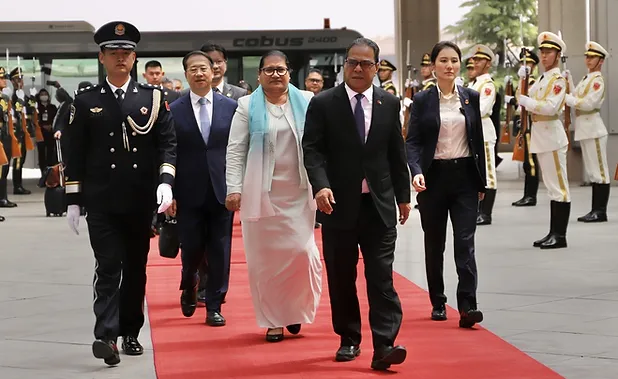Barely a month after completing new agreements under the Compact of Free Association with Washington, Micronesian President Wesley Simina recently met with Chinese President Xi Jinping, who offered to bring more infrastructure investments and other economic assistance to the Pacific island nation under Beijing’s Belt and Road Initiative.
According to a statement from the Federated States of Micronesia government, Xi pledged 100 million RMB (US$14 million) for the Pacific nation’s future projects.
Simina led a 15-member FSM delegation including First Lady Ancelly Simina, ranking cabinet officials and private sector representatives during a state visit from 05 – 12 April, highlighted by a grand welcome ceremony at the Great Hall of the People in Beijing.
It was Simina’s first visit to Beijing since assuming the presidency last year.
Xi thanked Simina for facilitating the adoption of a resolution affirming the FSM’s One China policy, which was passed by the FSM Congress last year during his tenure as the parliament’s speaker.
“President Xi stated that these efforts helped preserve the friendship between the FSM and China,” the FSM government said, marking this year’s 35th anniversary of diplomatic relations between China and the FSM.
The FSM Congress adopted the resolution in a clear rebuff of then-outgoing President David Panuelo’s initiative to sever ties with China and switch to Taiwan. On his way out, Panuelo wrote a 13-page letter to the FSM Congress, recounting China’s political warfare and bribery of politicians in the FSM.
Simina sought to “further deepen and continue the FSM-China comprehensive strategic partnership, defined by technical and economic cooperation and rooted in the principles of peaceful coexistence,” according to the FSM government.
“President Simina reaffirmed the FSM’s standing support of the One China policy and welcomed exploring other potential areas of cooperation such as through the Global Development Initiative to better facilitate the achievement of the UN 2030 Sustainable Development Goals,” the FSM government added.
In an earlier interview with the Pacific Island Times, Simina said that while he was satisfied with the outcome of the COFA negotiation, the dollar value of the U.S. commitment left much to be desired.
Under the COFA Amendment Act, the FSM stands to receive US$140 million in sector grants yearly or US$3.3 billion over 20 years.
Besides the US$400 million for the Yap airfield upgrade, the Micronesian leader said Washington has promised more infrastructure investments throughout other states of the FSM, in exchange for the U.S government’s exclusive defence rights in the Pacific island country.
The FSM is the only freely associated state that recognises China, which the U.S considers “the most challenging competition” in the region.
Simina has defended the FSM’s hedging diplomacy, saying its friend-to-all-enemy-to-none foreign policy “gives us the opportunity to be a peacekeeper in the region.”
During Simina’s state visit, “President Xi also stated his support to continue maintaining the longstanding relationships with Pacific island countries such as the FSM, cooperation in climate action and development projects as mutually agreed,” the FSM government said.
One of the FSM’s major projects funded through the Belt and Road Initiative is the soon-to-be-completed FSM-China National Convention Centre in Palikir.
“President Simina also encouraged continued and deepened cooperation in fisheries, agriculture, health, tourism, aviation & maritime transportation, trade, investment and climate change within the framework of the Belt and Road Initiative,” according to the FSM government.
The FSM delegation visited the provinces of Guangdong and Shandong, where they discussed “deepening the existing special relationships at the local level.”
The FSM has sister-state relations between Chuuk and Guangdong, between Rull Municipality and Zhongshan City, between Zhongshan City and Sokehs Municipality, and between Shandong and Kosrae.
“President Simina welcomed the opportunity to build on these relationships as well as establishing new ones to further collaboration in various sectors through continued high-level exchanges, people-to-people exchanges, cultural programs, student exchanges, and tourism,” the FSM government said.
The visit culminated in the signing of 10 memorandums of agreement that guaranteed China’s economic assistance to the FSM.














